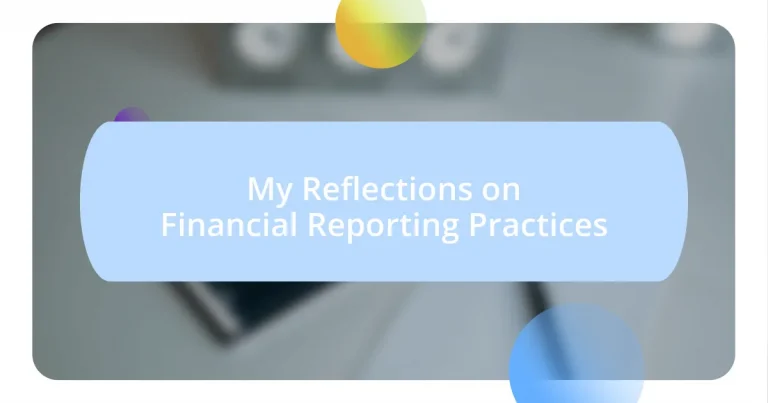Key takeaways:
- Financial reporting is essential for understanding a company’s performance and fostering transparency and trust among stakeholders.
- Accurate financial reports enhance decision-making, build credibility, and facilitate regulatory compliance.
- Common standards like IFRS and GAAP offer different frameworks that can significantly impact financial interpretations and business operations.
- Best practices, such as engaging stakeholders and utilizing technology with human oversight, are crucial for effective financial reporting.
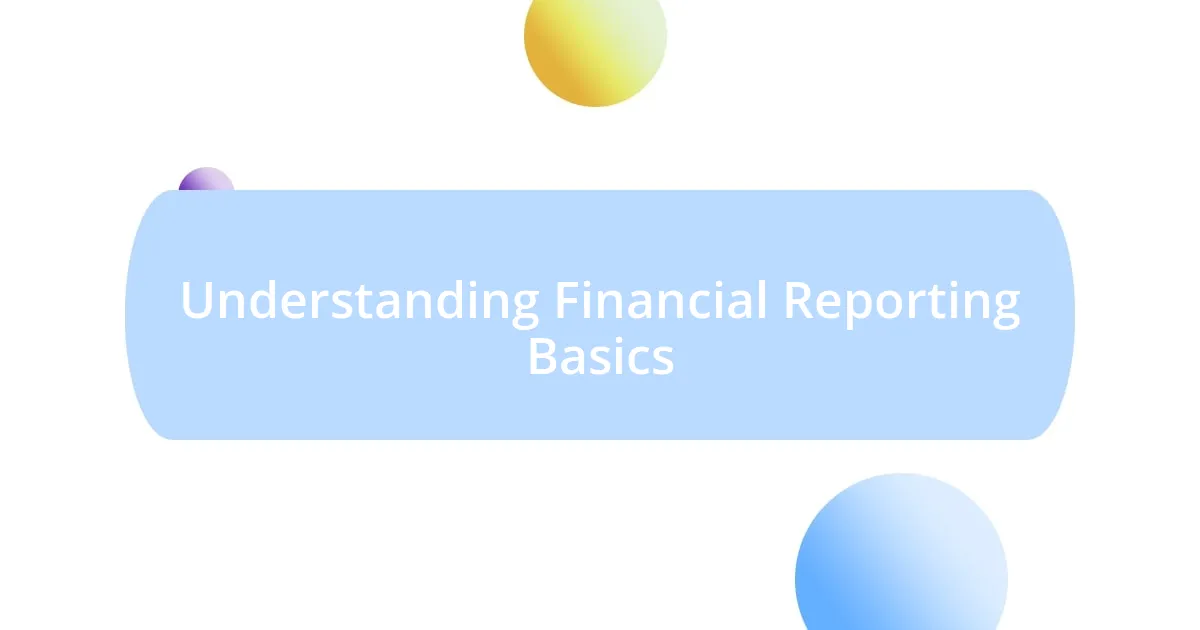
Understanding Financial Reporting Basics
Financial reporting serves as the foundation for understanding a company’s financial health. When I first delved into this world, I was overwhelmed by the technical jargon and complex concepts, like the balance sheet and income statement. Have you ever felt lost sifting through numbers that seem to tell a story completely foreign to you?
The heart of financial reporting lies in its ability to convey a company’s performance over a specific period. I vividly remember sitting with a friend, analyzing her startup’s financial reports. It struck me how crucial those documents were not just for external stakeholders, but for her as well—it illuminated where her business was thriving and where it struggled. Wouldn’t it be reassuring to know that a simple report can highlight both your strengths and weaknesses?
As I explored further, I noticed that good financial reporting goes beyond mere compliance; it’s about creating transparency and trust. Every time I review a set of financial statements, I’m reminded of the countless decisions impacted by that data. Isn’t it fascinating how a snapshot of figures can influence investments, hiring, and even the future direction of a company? Understanding these basics not only demystifies the process but empowers us to engage more meaningfully with financial decisions.
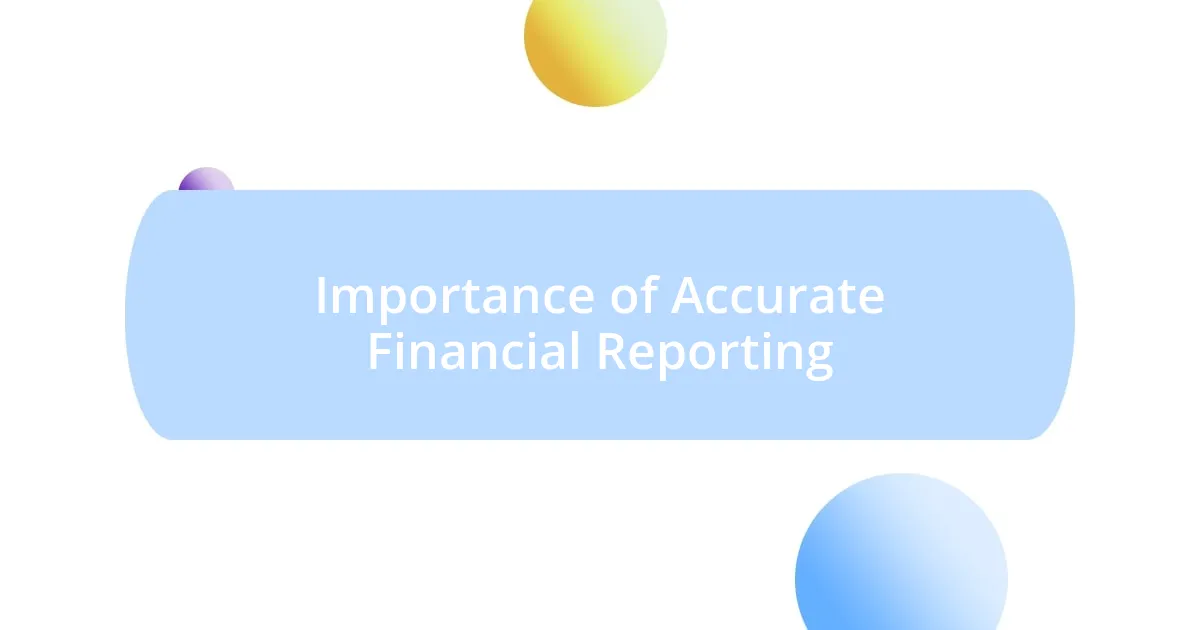
Importance of Accurate Financial Reporting
Accurate financial reporting is critical because it serves as the backbone of informed decision-making. When I experienced the pressure of managing my own small business, I quickly realized how financial reports were my compass. They guided me in making choices about budgeting and scaling operations. Without accuracy in these reports, I would have been sailing into uncharted waters without a map—a daunting thought.
- Builds Credibility: Accurate financial reports instill confidence among investors and stakeholders.
- Promotes Accountability: When figures are correct, everyone involved takes responsibility for their part in the financial picture.
- Enhances Performance Metrics: Accurate reporting enables businesses to compare past and current performance reliably.
- Facilitates Regulatory Compliance: It helps ensure adherence to laws and standards, avoiding costly penalties.
- Supports Strategic Planning: Reliable data allows for better forecasting and goal-setting, key for growth.
In essence, each number on those pages tells a part of my business’s story. I remember the first time I presented a meticulously prepared financial report to potential investors. The look of relief on their faces when they understood the figures meant that all my hard work translating raw data into clear narrative had paid off. That moment reaffirmed my belief in the power of accuracy—it’s not just about numbers; it’s about trust and clarity in a relationship built on financial performance.
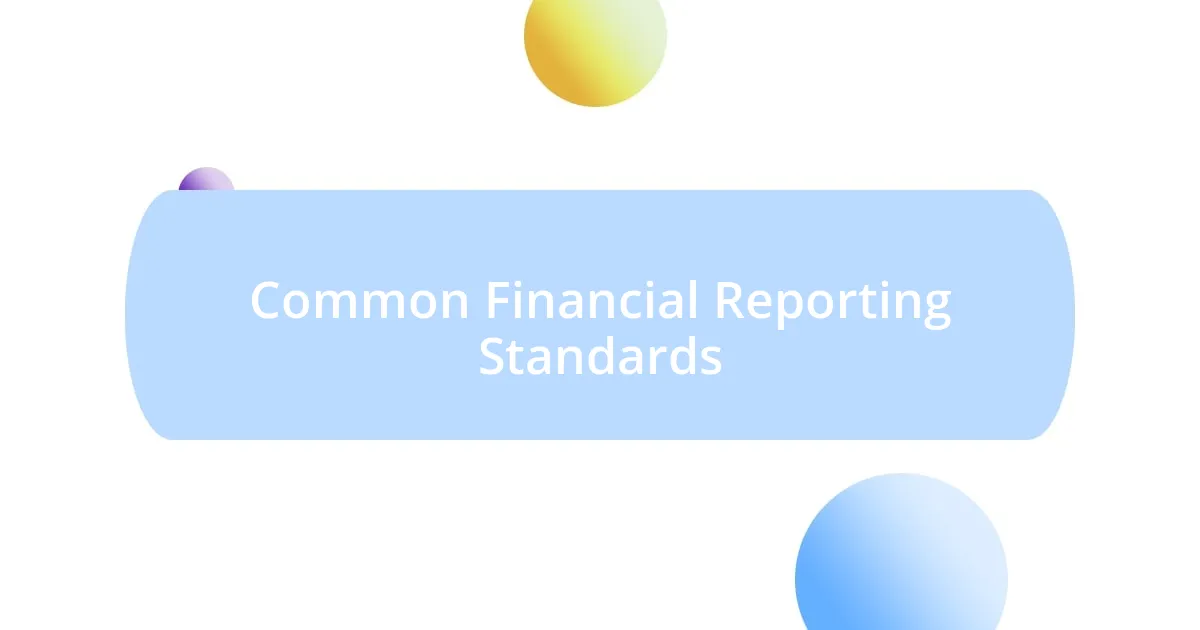
Common Financial Reporting Standards
Common Financial Reporting Standards are essential frameworks that guide how companies prepare and present their financial statements. I’ve often found myself comparing International Financial Reporting Standards (IFRS) with Generally Accepted Accounting Principles (GAAP) in the U.S. Each set has unique approaches that can lead to different interpretations of the same financial data. Have you ever wondered how this variance affects the image of a company’s financial health? It can be quite significant!
From my experience, IFRS emphasizes transparency and consistency, making it crucial for global businesses. An entrepreneur friend of mine, who expanded her operations overseas, had to familiarize herself with these standards for compliance. Learning this brought a sense of responsibility—ensuring her reports were in line with international expectations wasn’t just essential for legality; it became part of her company’s integrity.
Conversely, GAAP tends to be more rules-based, providing specific guidelines for specific scenarios. I remember a time when I advised a startup on their financial reporting. Using GAAP allowed them to navigate their financial challenges with clear benchmarks, which helped them secure funding. It was a vivid reminder that the right standards can be a game-changer, shaping not just reports, but also the future trajectory of a business.
| Standard | Description |
|---|---|
| IFRS | Global accounting standards focusing on transparency and comparability. |
| GAAP | U.S. accounting standards that are more prescriptive and detailed. |
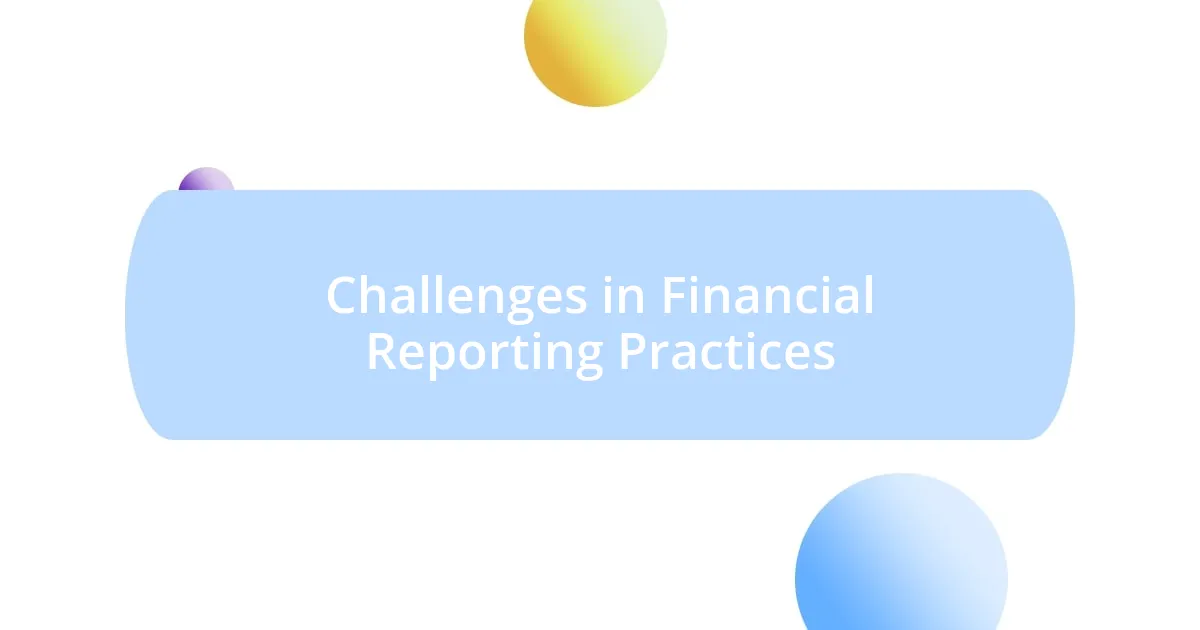
Challenges in Financial Reporting Practices
When I think about the challenges in financial reporting practices, one significant issue stands out: the complexity of regulations. The multitude of guidelines can feel overwhelming, especially for small business owners. I remember grappling with conflicting rules during my early days, which often left me questioning whether I was truly compliant. This uncertainty can create stress, making it more challenging to focus on growing the business.
Another hurdle I’ve encountered is the reliance on technology. While software can streamline the reporting process, I’ve faced moments where system glitches or incorrect inputs altered the accuracy of my financial data. Those instances were a stark reminder that while we lean heavily on technology, it’s vital to maintain a solid understanding of the figures behind the reports. Have you ever double-checked data only to discover that a tiny error significantly impacted your bottom line? That experience taught me the importance of human oversight, regardless of how advanced our tools might be.
Lastly, I often reflect on the transparency issue in financial reporting. Companies can selectively present data to create a more favorable image, which can be tempting, especially when investors are watching closely. Yet, I’ve seen firsthand how this approach can backfire—one of my peers faced severe backlash when discrepancies were uncovered. Honesty may feel daunting, but in my view, it’s the only sustainable path. In the long run, fostering a culture of transparency can build trust, and isn’t that what every business truly needs?
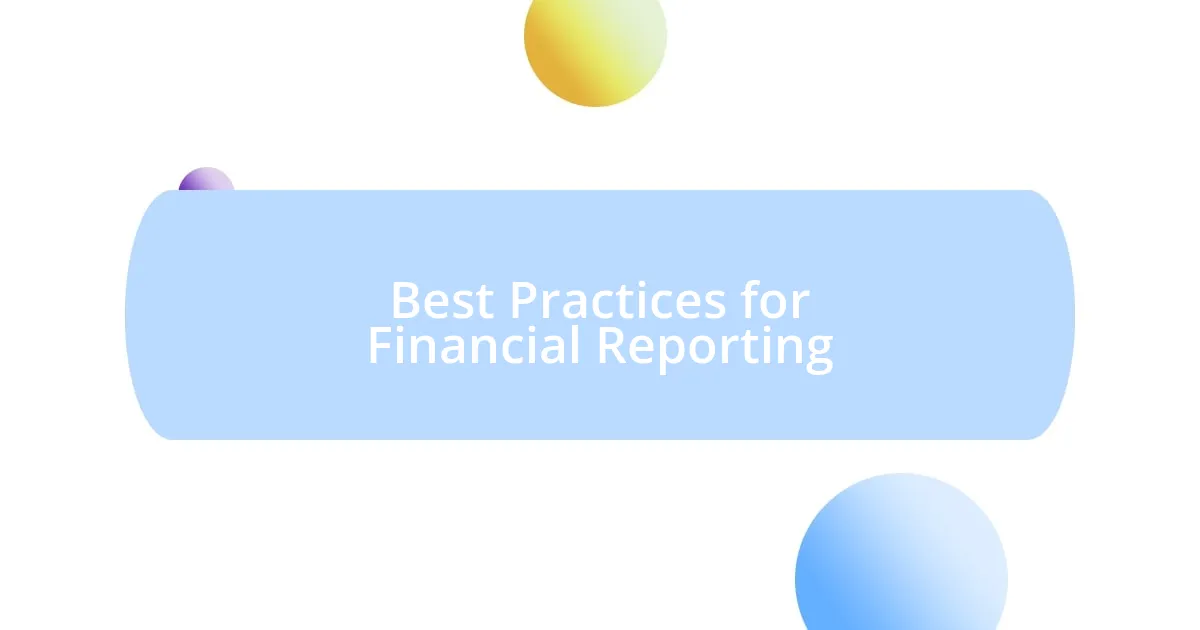
Best Practices for Financial Reporting
When I think about best practices for financial reporting, the first thing that comes to mind is the importance of accuracy. During a previous audit, I discovered that a simple miscalculation in revenue projection not only misled my investors but also created internal chaos. Have you ever faced a similar situation where correcting an error felt like untangling a web? It taught me that taking the extra time to double-check figures can save a lot of heartache later on.
Establishing a consistent reporting timetable is another best practice that I’ve found invaluable. When I first started out, I would wait until the last minute to gather and report financial data, which often led to missed deadlines and unnecessary stress. Now, I’ve set a schedule that allows me to prepare well in advance. I can’t stress enough how this proactive approach has not only improved my workflow but also enhanced my confidence in presenting results. Doesn’t it feel great to have everything in order ahead of time?
Lastly, engaging stakeholders in the reporting process can make a world of difference. I once participated in a financial review meeting where we invited team members from various departments to provide input. The diversity of perspectives not only enriched our reports but also fostered a sense of ownership among the entire team. It made me realize that financial reporting isn’t just a solitary task; it’s a collective journey. Isn’t it rewarding when everyone feels they have a seat at the table?
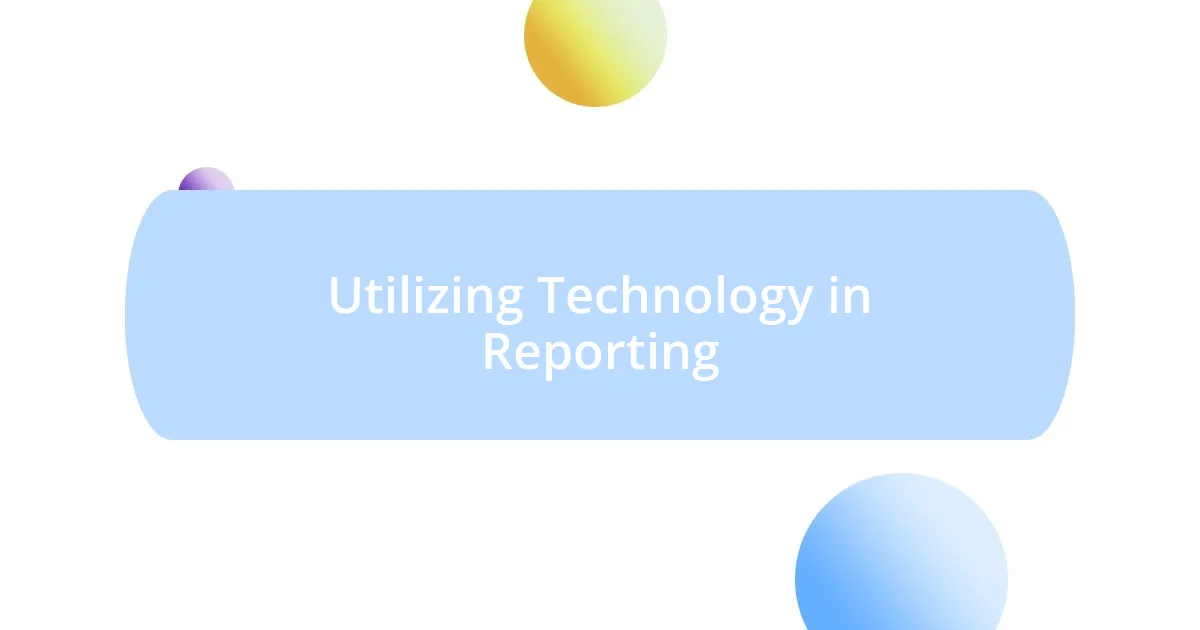
Utilizing Technology in Reporting
Utilizing technology in financial reporting has transformed the way we approach data management. I remember the first time I used advanced accounting software; it was like flipping a switch from darkness to light. Suddenly, I could visualize trends and metrics that were once buried in piles of paperwork. Isn’t it incredible how a single tool can save hours of tedious work while providing insights at our fingertips?
However, I’ve also learned that we must be cautious not to become overly dependent on technology. There was a time when our team relied on automated reports without scrutinizing the underlying data. A fateful oversight revealed that our automated calculations had omitted key expenses, resulting in inflated profits. That experience was a jarring wake-up call. Have you ever had a similar moment where technology let you down? It reinforced my belief in balancing automation with human verification—a necessary compromise to ensure our reports remain trustworthy.
Finally, exploring innovative reporting methods, such as data visualization tools, has been a game changer for me. I vividly recall presenting a complex financial analysis filled with numbers and metrics. To spice things up, I transformed that data into interactive graphs and charts. The shift in audience engagement was palpable. Isn’t it fascinating how visuals can breathe life into dry statistics? This approach not only clarified complex information but also allowed for more meaningful discussions around our financial health. Embracing technology doesn’t just simplify the process; it enhances our storytelling capabilities in ways we never imagined possible.












